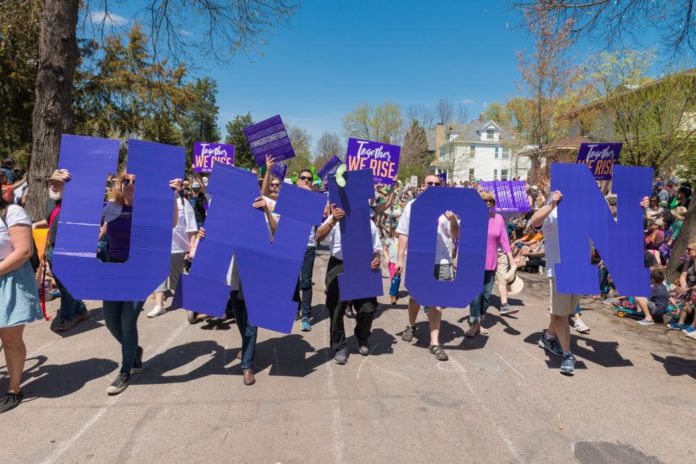Minnesota Personal Care Attendants (PCAs) are speaking out about the Trump administration’s decisionto prevent unions from taking hundreds of millions of dollars from their paychecks.
The Obama-era rule allowed Medicaid payments to be diverted to government unions, which the Trump administration found violates the Social Security Act.
“The rule change means family members and friends who stay home to care for loved ones will keep all of the Medicaid payments intended for them, rather than paying hundreds of dollars to the SEIU,” the state’s fiscal conservative think tank, the Center of the American Experiment, said in a statement.
The Service Employees International Union (SEIU) is one of two of the largest public sector unions in the country that lost more than 90 percent of their fee-paying nonmembers less than one year after the U.S. Supreme Court’s decision in Janus vs. AFSCME.
“Currently, the state of Minnesota takes money out of Medicaid support checks meant to improve the quality of life of America’s sick, elderly and disabled, and gives it to the SEIU,” the center explains.
The process of unions siphoning money from Medicaid became legal in 2013 after former Gov. Mark Dayton and the majority-DFL Legislature passed a law stating that PCAs were “public employees.” But Minnesota PCAs maintain that they are not public employees and don’t receive public employment benefits like pensions or health care. Rather, they are often caring for family members and others in their own homes.
In Minnesota, the SEIU has taken 3 percent of PCA gross wages with a cap of $948.
“According to estimates based on federal filings, the SEIU in Minnesota skimmed $4.7 million from PCAs’ Medicaid payments in 2016,” the center states – an amount higher than the average dues K-12 teachers pay to the Education Minnesota union.
“What this means is that, while the collective bargaining units remain certified for now, the unions will have to collect their own dues,” Kim Crockett, the center’s vice president and general counsel, said. “That protects the program dollars from abuse and forces the unions to demonstrate value to their remaining members.”
Kris Greene, a Lakeville mother of a disabled daughter and a PCA, argues her home “is not a union workplace.”
“The Medicaid program worked better before the SEIU horned its way into our lives,” she added. “We are grateful for this rule change but the remaining problem is that the SEIU still speaks for me and all Choice PCAs at the Capitol. But they never ask me what I want.”
The center created EmployeeFreedomMN.com as part of its awareness campaign to help public employees make educated decisions about their union membership. The website answers frequently asked questions about Janus in addition to providing practical information like how to find their union card, and learning what types of representation to which non-union members are entitled after they resign their membership. The site also simplifies the process to leave government unions.
The UMLC is also representing Laura Loescher, who manages the Scandia Elementary School site in the Forest Lake Public School District, and is challenging her union membership and continued dues deductions.
Seaton says UMLC “will also stand up for other public employees who come forward wanting to exercise their rights to free speech.”
In a statement, SEIU said it would challenge the rule in court.
“SEIU members plan to challenge this rule in court and will continue to join other SEIU members and Fight for $15 and a Union leaders in calling on elected leaders and candidates to commit to making sure all working people – Black, white and brown – have the opportunity to join together in a union, no matter where they work,” the statement said.
“The Medicaid program worked better before the SEIU horned its way into our lives,” she added. “We are grateful for this rule change but the remaining problem is that the SEIU still speaks for me and all Choice PCAs at the Capitol. But they never ask me what I want.”
Greene helps lead MNPCA.org, a coalition of PCAs trying to decertify the SEIU and raise awareness about the abuse of Medicaid funds. She is also lead plaintiff in litigation challenging the use of Medicaid dollars on unions.
“No parent should be coerced into paying a union just to care for their own disabled child,” Catherine Hunter, a PCA from Burnsville with several disabled children, said.
“Instead of steady pay raises across the board, the SEIU has lobbied for paid time off and training stipends that are hard to navigate and of little use to most PCAs, especially when we care for a family member. The SEIU has made it harder for the disabled to get the coverage they need. This rule change will help focus PCAs on whether the SEIU has helped or harmed the program.”
Prior to the final rule change, the center submitted a public comment supporting the change. It said: “Despite the clear prohibition in Section 32, Minnesota is diverting Medicaid monies from their intended purpose – paying for care for the disabled – to subsidize political activities conducted by government unions, as well as ‘training’ used for union recruitment and indoctrination; and while assignments of union dues from payments to home health care providers have been both voluntary and involuntary in Minnesota, the voluntariness of an assignment is irrelevant under Section 32, which prohibits even voluntary assignments, except to government agencies or by court order.”
In 2014, the U.S. Supreme Court ruled in Harris v Quinn that PCAs paid through Medicaid were not public employees and could not be compelled to pay union fees. In 2018, the court extended that ruling to all public employees in Janus v AFSCME.
Doug Seaton, a labor attorney and president of the Upper Midwest Law Center (UMLC) who represents MNPCA.org, said, “The rule change makes it more likely that the SEIU can be decertified, or even that the union will walk away from PCA representation because the SEIU is in this for the money and very few PCAs will pay them directly.”
The article was republished with permission from www.watchdog.org

















